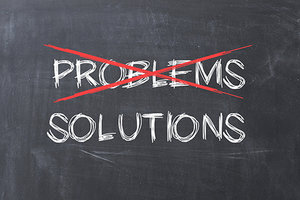I don't care about money ... I just want to help people. I have heard this from doctors for more than three decades. I also said the same thing when a man I befriended started teaching me business skills.
"What's the problem, Shawn?"
"Well, Dr. Charles, you have to pay for that video."
"It's OK, I'll get you next month."
"No, Dr. Charles, that's not how it works. You have to pay now."
My mortified staff stared at me and asked, "Dr. Charles, what are you doing?"
I turned to them as I asked Shawn, "Oh, I have to pay at the time of purchase ... or when services are rendered?"
 My staff, while not amused, definitely got the message. I brought them back to the office and said strongly, "Look, we are providing a valuable service and patients must pay at the time of service. If you do not understand, then I'll tell you what ... you will all have to wait to get paid until I get paid."
My staff, while not amused, definitely got the message. I brought them back to the office and said strongly, "Look, we are providing a valuable service and patients must pay at the time of service. If you do not understand, then I'll tell you what ... you will all have to wait to get paid until I get paid."
Needless to say, no one ever left again without paying for treatment. In fact, shortly after this time I stopped taking insurance all together and went to a pay-for-service practice. (I don't like the term cash practice because I accept credit cards and checks.)
Not Getting Paid on Time
This story elucidates the No. 1 problem any business, including yours, can have: not getting payment at the time of service. It is a psychological fact that the perceived value of a service diminishes once it is rendered. This makes collecting money down the road a negative experience.
Not only that, but I believe for healing to occur, there must be an exchange of energy. In other words, if you are working to put some energy into a patient to heal, the patient must give you energy, too.
I used to think it was cruel when I would hear a story about some child in a small town who needed a surgery that cost, let's say $30,000; otherwise, he would die. The town would hold a fundraiser to get the money together and the child's life would be saved. I used to think, Just do the darn surgery for free.
I believe the energy of the whole town getting together had as much to do with the healing as the procedure itself. They put a value on the procedure. If you do not collect a fair return for your service, how do you expect the patient to value your treatment? You may think you are being nice, you are actually doing a disservice if you do not charge a fair price and collect the fee.
The manager of a highly successful restaurant in Orange County, Calif., has a sign up on the wall that reads, "In God We Trust. All Others Pay Cash." He is using humor to make the point that there is a price to pay for good service and good food. Remember this point. People must pay for your services – and the better service and more services you provide, the more you deserve to be remunerated.
How to Ensure Immediate Payment
1. Have a sign at the reception desk that clearly states, "Full Payment Is Due at Time of Service." It is amazing that when something is written down, it is considered an immutable fact. Having this in black and white will take care of the issue in most cases.
2. If you must say it verbally, make sure you and your staff say it in this manner: "It is office policy that full payment is due at the time of service." Using the words "office policy" makes it a general law, if you will, and removes the sting out of patients taking it personally.
3. Explain to patients that you will give them a receipt to send to their insurance that says, "Paid in Full." Never call it a superbill. No one likes to receive one of those.
4. If a patient asks, "Can you bill me?" Your reply should be, "We do not bill patients because we would have to hire more staff and charge you for that. Now you only pay for me to take care of you." In 20 years, I have never had a patient have an issue with that reasoning. I guarantee neither will you!
5. Finally, it is one thing to have the confidence in what is called a "cash practice," but you also want to make it as financially feasible for your patients as possible. It is helpful to let your patients know about Flexible Spending Accounts (FSAs) through their employer and Health Savings Accounts (HSAs). Familiarize yourself with HSAs and spread the word. If you would like the email that I send out to patients feel free to contact me and I will send it to you so you can share it with your patients. Incidentally, get an HSA for yourself; it has more tax benefits than an IRA.
Dr. Eugene Charles graduated from the Los Angeles College of Chiropractic in 1987 and attained a diplomate in applied kinesiology in 1994. He has certified hundreds of doctors in A.K. through his seminars and DVD programs, and recently developed the first online A.K. certification course. Dr. Charles is also the author of Precision Adjusting for the Master Chiropractor and the Practice Leadership Program; learn more at www.charlesseminars.com.




